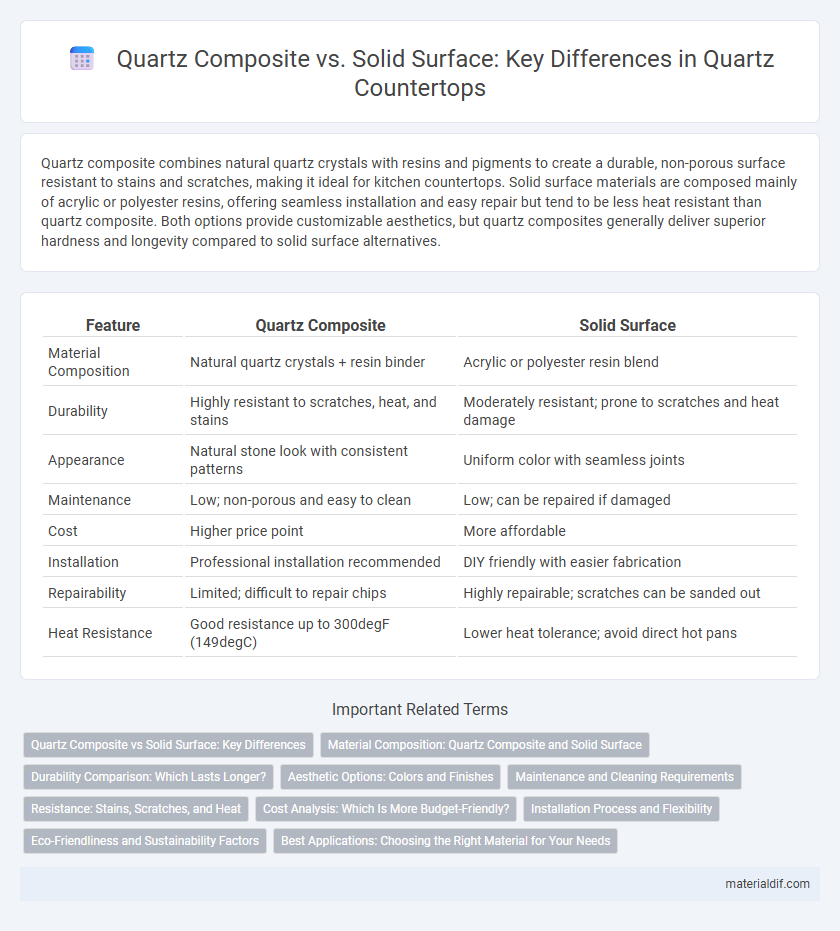Quartz composite combines natural quartz crystals with resins and pigments to create a durable, non-porous surface resistant to stains and scratches, making it ideal for kitchen countertops. Solid surface materials are composed mainly of acrylic or polyester resins, offering seamless installation and easy repair but tend to be less heat resistant than quartz composite. Both options provide customizable aesthetics, but quartz composites generally deliver superior hardness and longevity compared to solid surface alternatives.
Table of Comparison
| Feature | Quartz Composite | Solid Surface |
|---|---|---|
| Material Composition | Natural quartz crystals + resin binder | Acrylic or polyester resin blend |
| Durability | Highly resistant to scratches, heat, and stains | Moderately resistant; prone to scratches and heat damage |
| Appearance | Natural stone look with consistent patterns | Uniform color with seamless joints |
| Maintenance | Low; non-porous and easy to clean | Low; can be repaired if damaged |
| Cost | Higher price point | More affordable |
| Installation | Professional installation recommended | DIY friendly with easier fabrication |
| Repairability | Limited; difficult to repair chips | Highly repairable; scratches can be sanded out |
| Heat Resistance | Good resistance up to 300degF (149degC) | Lower heat tolerance; avoid direct hot pans |
Quartz Composite vs Solid Surface: Key Differences
Quartz composite surfaces consist of approximately 90% natural quartz crystals combined with resin, offering superior durability and scratch resistance compared to solid surfaces, which are primarily made from acrylic or polyester resins. Solid surfaces provide seamless joints and easier repairability but lack the hardness and heat resistance of quartz composites. Quartz composite materials excel in non-porosity, making them highly resistant to stains and bacterial growth, unlike some solid surface options.
Material Composition: Quartz Composite and Solid Surface
Quartz composite is primarily composed of natural quartz crystals mixed with resin and pigments, offering high durability and resistance to scratches and stains. Solid surface materials consist mainly of acrylic or polyester resins combined with alumina trihydrate, providing a non-porous, seamless finish that is easy to repair and maintain. Quartz composite features a higher quartz content, which enhances its hardness and heat resistance compared to solid surface materials.
Durability Comparison: Which Lasts Longer?
Quartz composite surfaces offer superior durability compared to solid surface materials due to their natural quartz content, making them highly resistant to scratches, heat, and stains. Solid surfaces, typically made from acrylic or polyester resins, are more prone to dents and burns but can be easily repaired by sanding or polishing. The hardness and resilience of quartz composites ensure a longer lifespan in high-traffic or heavy-use areas, making them a preferred choice for durable countertops.
Aesthetic Options: Colors and Finishes
Quartz composite offers a wide range of colors and finishes, including vibrant patterns that mimic natural stone with consistent textures. Solid surface materials provide a more limited palette, typically featuring uniform colors and matte or semi-gloss finishes that blend seamlessly for a smooth appearance. The choice between quartz composite and solid surface hinges on the desired aesthetic impact, with quartz delivering more variety and visual complexity.
Maintenance and Cleaning Requirements
Quartz composite surfaces feature non-porous properties that resist stains and bacterial growth, requiring only mild soap and water for routine cleaning. Solid surface materials, while also non-porous, can be more susceptible to scratches and may need periodic buffing or polishing to maintain their appearance. Both options avoid harsh chemicals, but quartz composite generally demands less upkeep due to its enhanced durability and resistance to discoloration.
Resistance: Stains, Scratches, and Heat
Quartz composite surfaces offer superior resistance to stains, scratches, and heat compared to solid surface materials, thanks to their high quartz content and durable resin binders. Solid surfaces, while non-porous and resistant to many stains, are more susceptible to scratching and can suffer heat damage from hot pans or ovens. The enhanced hardness and thermal stability of quartz composites make them a preferred choice in kitchens and high-traffic areas requiring long-lasting durability.
Cost Analysis: Which Is More Budget-Friendly?
Quartz composite tends to be more budget-friendly than solid surface materials due to its lower manufacturing costs and higher durability, reducing long-term expenses. Solid surface countertops, while offering seamless installation and easier repair, generally come with a higher upfront price and potential replacement costs over time. Homeowners seeking cost efficiency often prefer quartz composite for its balance of affordability and performance.
Installation Process and Flexibility
Quartz composite countertops offer a streamlined installation process due to their engineered consistency and uniform thickness, allowing precise cuts and easier fitting in kitchens and bathrooms. In contrast, solid surface materials provide greater flexibility, enabling craftsmen to create seamless joints and intricate shapes through heat forming and fabrication techniques. Both materials require professional installation, but quartz composite is often preferred for straightforward applications while solid surface excels in custom, curved designs.
Eco-Friendliness and Sustainability Factors
Quartz composite surfaces combine natural quartz with resins and pigments, offering enhanced durability while incorporating recycled materials, which reduces environmental impact compared to purely synthetic options. Solid surface materials, primarily made from acrylic or polyester resins, often require more energy-intensive production processes and contain fewer recycled elements, leading to higher carbon footprints. Choosing quartz composites supports sustainability goals by maximizing natural resource use and promoting recyclability, aligning better with eco-friendly construction and design standards.
Best Applications: Choosing the Right Material for Your Needs
Quartz composite offers superior durability and stain resistance, making it ideal for kitchen countertops and high-traffic areas, while solid surface excels in seamless integration and repairability, perfect for bathroom vanities and custom designs. Quartz composite's non-porous nature resists bacteria and heat, supporting hygiene and longevity in cooking spaces. Solid surface materials provide greater design flexibility with their ability to be thermoformed and easily refinished, suiting creative installations and smooth, continuous surfaces.
Quartz Composite vs Solid Surface Infographic

 materialdif.com
materialdif.com